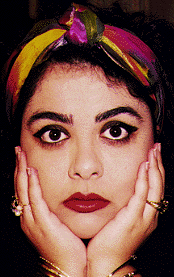
Identity Crisis:
Who am I?
By Bahar M. Jaberi
Portland, Oregon
March 1996
The Iranian
We all know a lot of us left Iran without having any control over our destinies. Our parents decided that we should leave and we did. Some of us were even too young to remember anything of the old country.
I'm referring to us, the confused generation of Iranians. We don't know if we should call ourselves, Iranian, American, or Iranian-American.
If we say we're Iranian, we feel uneasy. We live in America; we go to American schools, we have to try to conform to the American social standards and we speak English at least twelve hours a day. Some of us can even feel the significance of going to baseball games and eating a hotdog.
Often times it is feelings of shame and embarrassment that get us into trouble. We are afraid to introduce our parents to our friends because our parents have a heavy accent and might say things incorrectly.
We break out in a cold sweat when we invite our friends over to the house and Iranian music is blaring from the stereo. We want to run and hide when our father suddenly decides to make conversation with our friend.
To alleviate some of the pressures inflicted on us by none other than ourselves, we tend to create an identity outside of the house. We become American to the extent that if someone asks us where we're from, we say, "Why do you ask? I'm American."
We assume American names and American ways. But what happens when we go back home into the warm bosom of our parents? We fight. There is constant conflict between us. We poke fun; we're sarcastic; we challenge everything they say.
My younger brother, Kiarash, was like that for a very long time. He was only seven years old when we left Iran. He practically grew up without a lot of guardianship because both my parents had to work.
When my parents tried to tell him what to do, he resented them. This resentment transformed itself into something that belonged exclusively to the fact that my parents were from a different culture.
There was no going around it. His disrespect grew day by day and his anger along with it. The more they spoke to him, the more they enflamed him and the less they spoke to him, the more guilty they felt.
He went through all the escapist attitudes which are an element of our mixed cultural background. For example, several years ago I went to an all Iranian picnic sponsored by the university. My brother was helping himself to the goodies that were laid out on the table.
One of the professors approached him and asked him his name. My brother panicked and shamelessly said, "No comprendes." I smacked him on the arm and said, "If you're going to speak Spanish, at least speak it correctly," and I introduced him to the gentle professor who was trying very hard to contain his laughter.
My brother has come a long way since he used to throw tantrums and scream at my parents about how he hates Iranians and everything Iranian. Now, when you stop him on the street and ask him where he's from, he even says he's Iranian -- with no regrets.
When he went for his citizenship hearing a couple of years ago, the immigration officer asked him if he wanted to change his name. He tried out some names like Christopher and even Keesh, but he finally said, "Do I have to change my name? Kiarash is my identity."
I'm not saying that a simple thing such as a name gives one a sense of identity, but I think it was a positive first step for my brother toward understanding his biculturalism. We all travel the steep steps of understanding who we are, one way or the other.


